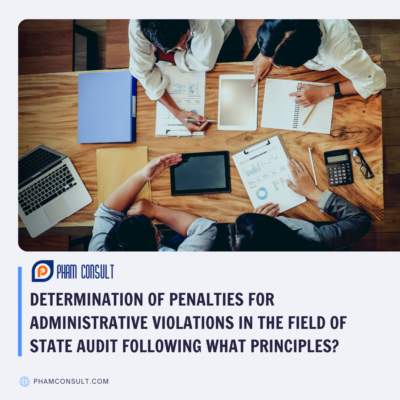Like other legal liability prosecution activities, sanctioning of administrative violations must follow certain principles to punish properly and accurately, while protecting the rights and interests of the State and society. , while still effectively protecting the legitimate rights and interests of sanctioned individuals and organizations. So for auditing, state accounting also has regulations on sanctioning administrative violations in this field. Through today’s article, let’s learn more about this issue with Pham Consult!

1. Which cases do not sanction administrative violations in the field of state audit?
Cases of not sanctioning administrative violations in the field of state audit are specified in the Guidelines on implementing sanctions for administrative violations in the field of state audit issued by the State Auditor General together with Article 4 Decision 811/QD-KTNN in 2023 as follows:
Cases of not sanctioning administrative violations in the field of state audit
No administrative penalties shall be imposed in the field of state audit in the following cases:
- Committing administrative violations in urgent situations;
- Committing administrative violations due to unexpected events;
- Committing administrative violations due to force majeure events;
- Persons who commit administrative violations do not have administrative responsibility capacity.
Accordingly, cases where administrative violations are not sanctioned in the field of state audit include:
– Committing administrative violations in an urgent situation;
– Committing administrative violations due to unexpected events;
– Committing administrative violations due to force majeure events;
– Persons who commit administrative violations do not have administrative responsibility capacity.
2. How to determine the fine level when sanctioning administrative violations in the field of state audit?
Principles for determining fine levels are specified in the Instructions on implementing sanctions for administrative violations in the field of state audit issued by the State Auditor General together with Article 3 of Decision 811/QD-KTNN in 2023 as follows: after:
Principles of determining fines
Principles for determining specific fines for administrative violations in the field of state audit prescribed in Article 8, Article 9, Article 10, Article 11, Article 12, Article 13 and Article 14 of France Order number 04/2023/UBTVQH15 as follows:
- The specific fine level for an administrative violation without aggravating or mitigating circumstances is the average level of the fine bracket prescribed for that act.
- If there are extenuating circumstances, the fine level may be reduced but must not be reduced below the minimum level of the fine frame; If there are aggravating circumstances, the fine may be increased but must not exceed the maximum fine of the fine frame.
- In cases where there are many aggravating and mitigating circumstances, the following principles apply:
- a) When determining the fine level for organizations and individuals whose violations have both aggravating and extenuating circumstances, the aggravating circumstance will be reduced according to the principle of one extenuating circumstance being reduced. an aggravating circumstance;
- b) In case there are 02 or more extenuating circumstances, the minimum level of the fine frame shall apply; If there are 02 or more aggravating circumstances, the maximum level of the fine frame will apply.
- Extenuating circumstances and aggravating circumstances are implemented according to the provisions of Article 9 and Article 10 of the Law on Handling of Administrative Violations.
3. Accordingly, determine the fine level when sanctioning administrative violations in the field of state audit according to the following principles:
– The specific fine level for an administrative violation without aggravating or mitigating circumstances is the average level of the fine frame prescribed for that act.
– If there are extenuating circumstances, the fine level may be reduced but must not be reduced below the minimum level of the fine frame; If there are aggravating circumstances, the fine may be increased but must not exceed the maximum fine of the fine frame.
– In case there are many aggravating and mitigating circumstances, the following principles apply:
+ When determining the fine level for organizations and individuals violating both aggravating and extenuating circumstances, the aggravating circumstance will be reduced according to the principle of one extenuating circumstance being reduced by one. aggravation;
+ In case there are 02 or more extenuating circumstances, the minimum level of the fine frame shall apply; If there are 02 or more aggravating circumstances, the maximum level of the fine frame will apply.
– Extenuating circumstances and aggravating circumstances are implemented according to the provisions of Article 9 of the Law on Handling of Administrative Violations 2012 and Article 10 of the Law on Handling of Administrative Violations 2012.
3. What is the responsibility of the State Audit Office for sanctioning administrative violations in the field of state audit?
The responsibilities of the State Audit Office are specified in the Guidelines on the implementation of sanctions for administrative violations in the field of state audit issued by the State Auditor General attached to Article 8 of Decision 811/QD-KTNN 2023 as follows:
Responsibilities of the State Audit Office
Preside and coordinate with the Legal Department to guide and ensure funding for law enforcement on handling administrative violations in the field of state audit.
…
Accordingly, the State Audit Office is responsible for presiding over and coordinating with the Legal Department to guide and ensure funding for law enforcement on handling administrative violations in the field of state audit.
Thus, in the article on Pham Consult, you have also clarified more about the sanctioning of administrative violations in auditing. Hope the above information will be useful to you.




 VI
VI